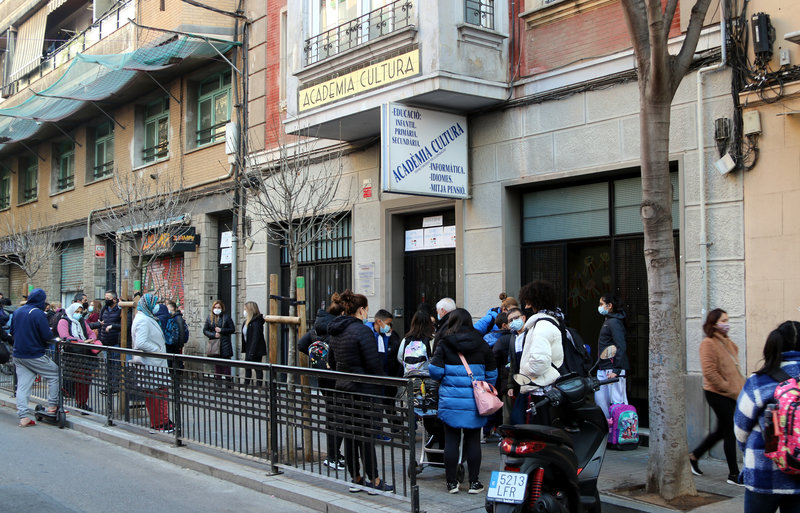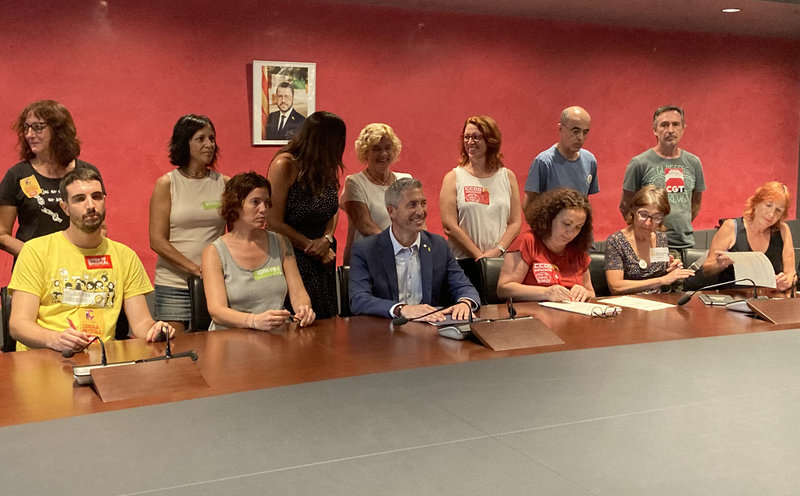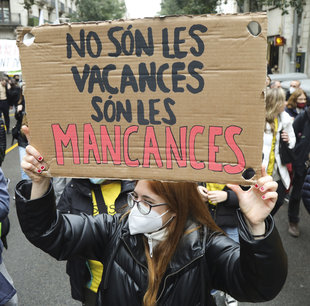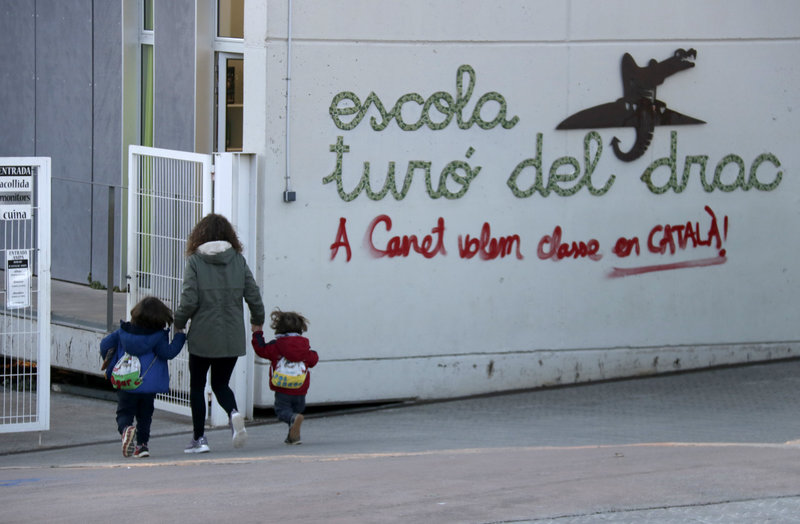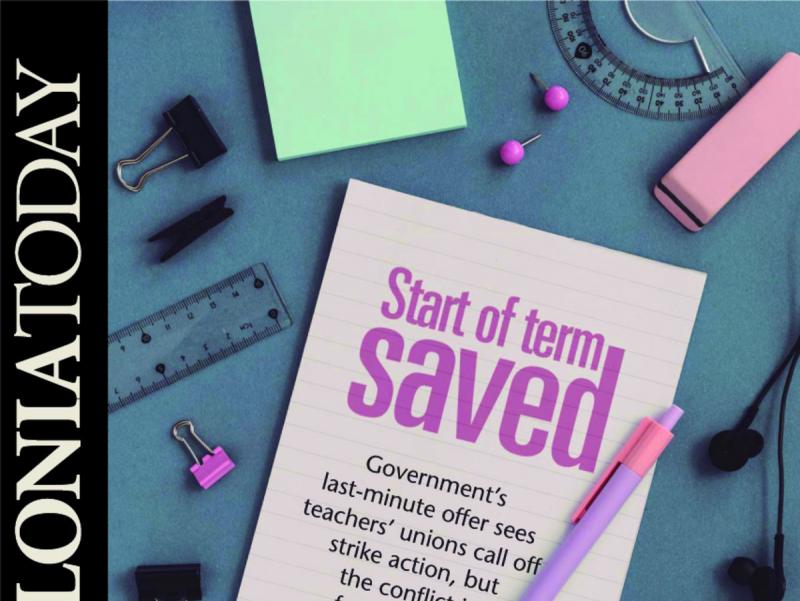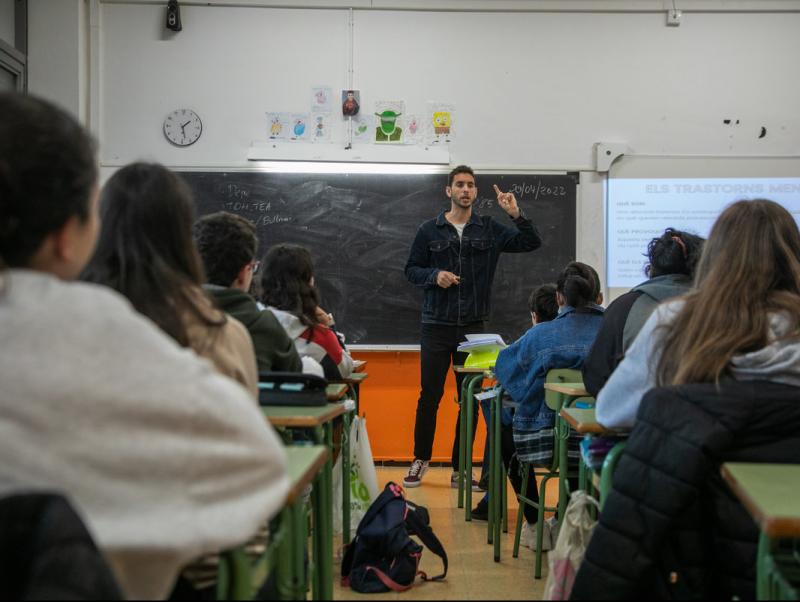The keys to the new school year
A reduction of one teaching hour for teachers, free schooling for three to six year-olds and the implementation of a new curriculum are some of the measures being introduced in the 2022/23 academic year
70 teaching staff
and 3,117 educational care staff70 pupils
enrolled for this school year, 5,000 fewer than in the previous oneinvested to apply
the reduction of one teaching hourOnly a few days before the start of the school year, the Catalan Department of Education, represented by its secretary, Josep Gonzàlez-Cambray, the General Secretary of Education, Patrícia Gomà, and the Secretary of Educational Transformation, Núria Mora, revealed all the changes for a school year that will mean a return to normality, at least in terms of measures relating to the pandemic: no masks, no bubbles and no organisational health measures.
“These last three years have not been easy. In this new school year that we are starting there are no health measures and we must be able to reconnect with the thrill of teaching. Trust, honesty and the pride of being a teacher are essential to face up to new educational challenges,” said the secretary. This was before the unions had decided on whether to go ahead with further protests or accept the department’s offer of returning to the school timetable prior to the education cuts of 2012. The agreement finally arrived on September 1.
Regarding each of the measures that will mark the new school year, and which are detailed below, the secretary invited everyone to ask themselves two questions: “Are the new measures good for pupils? And does this innovation permanently transform the education system? For me, these are both fundamental questions.” As for the unions, they say there is still a long way to go in the negotiation process.
Early start
One of the new measures that has captured most headlines due to the effects it has on teachers, pupils and families is the bringing forward of the school calendar to September 5 for infant and primary education, and to September 7 for secondary schools. Gonzàlez-Cambray believes that this change favours pupils, especially the most vulnerable, “because it shortens the long summer break” and helps the family work life balance. In order to cover the afternoons of September, the secretary ensured that 100% of publically-funded schools already have some 1,683 contracts in place to hire school monitors. He also stated that with the aim of a smooth transition to this timetable change, “the appointment of new teachers had been moved forward, with 43,302 teachers appointed by the end of June, one month earlier than usual,” while also committing to “evaluating progress” in the new year, “in order to “make the best decisions for the following year”.
One hour less
This was one of the red lines for the unions. From January 1, 2023, teachers will teach one hour less per week in both primary and secondary schools, with the measure starting mid-term. “The workers’ representatives have always told us, from day one, that their main aim is to reduce the teaching hours in both primary and secondary schools,” the secretary explained. “We always do what we say we will do in this department. And as soon as we were able to, and there was the budget for it, we made the proposal to the unions to reduce the teaching hours from January 1.” This hour reduction must be dedicated “to coordination, pedagogical debates and responding to the new projects required by the Catalan education system”. The measure will cost 170 million euros and will require the hiring of 3,472 new teachers. There will be 1,463 new teachers in primary at a cost of 67 million euros, and 2,009 teachers in secondary schools at a cost of 103 million euros. “It is a good measure because it will increase the quality of the education system,” the secretary stressed.
Fewer students in class
This year “there will be fewer students, more groups and more teachers.” The reduction in ratios begins in classes of 3 to 6 year-olds (P3): “We will go from 25 to 20 students in all schools where it can be done.” According to the department, almost 90% of publically-funded schools and 30% of private subsidised schools will apply the measure. The reduction will be maintained in successive years until the entire primary stage is completed.
Infants free
It is the first year in which the 2nd year of infant education will be free in public nursery schools, and there will also be subsidies for families who send their children to private schools. The department will fund municipal nurseries to the tune of 1,600 euros each, while families with children in private nurseries will get 800 euros per child per year, rising to 1,600 euros for children from vulnerable families. The number of rural nursery schools will also double: 52 municipalities will get a nursery school for the first time.
New curriculums
2022/23 will be the year that new curriculums are introduced, although they are still in the final phase of processing and had not yet been approved by the time the new school year started. The Secretary for Educational Transformation, Núria Mora, recently stressed that schools already have the draft curriculum to work work, and she is confident that these will not change much with respect to the final versions. “The new curriculum – which comes from the Spanish state law on education – states that enforcement is to begin with core courses this year. For the first time it is a curriculum we have participated in designing, which makes us proud. Catalonia is the only region that has participated in designing the curriculum in terms of everything that has to happen in a classroom,” Mora explained. Schools have a lot of freedom over how they apply the new curriculum.
Admission decree
This will be the first year that the so-called admission decree is implemented, which provides for “a balanced distribution of pupils”. For the first time, places for pupils with specific educational needs are reserved until school starts, “which facilitates an equitable distribution of places for the more vulnerable.” Catalan Education Secretary Josep Gonzàlez-Cambray explained that pupils will start nursery, primary and secondary school, “with all the necessary economic resources associated with their schooling”: publically-funded schools will receive 384 euros per student, and subsidised private schools, 988.
Inclusive schooling
“We want to start a change of direction towards more inclusive schooling; we need to improve.” Gonzàlez-Cambray announced that there will be an external assessment on the status of the rollout of the new inclusive school decree, and that the results of the evaluation will be available later this year. “One in five students has specific educational needs, so we need to be able to allocate resources to them.”
Vocational training
“This is and will be the term of vocational training (VT); we must give it a new impetus so that VT responds to the needs of the labour market,” Gonzalez-Cambray said. The challenges are to increase places and improve the pre-registration and enrolment procedures. Regarding deadlines, he stated that “the procedures to carry out the entire process will be improved before the start of the academic year”.
Climate emergency
The education department has sent new instructions to all schools for dealing with heat waves, and assured them that a climate emergency plan will also be drawn up to address heating in schools and allow them to progressively adapt to the new climate situation.
feature education
feature education
“No classroom will comply with 25% in Spanish, and this heralds a triumph”
As of Monday September 5, the start of the new term, “no classroom in this country” would apply the rule of 25% of the class being in Spanish, according to the Catalan education secretary, Josep Gonzàlez Cambray. This, he said, “heralds a triumph for the country, which is what happens when we all pull in the same direction”.
The department sent a letter to all schools stating that they will have to comply with the new Catalan regulatory framework – the new law and the new decree on Catalan in schools approved before the summer – which avoids the use of percentage quotas in education. This also affects the 27 schools (and a total of 48 classrooms) that had been obliged to comply with a Spanish ruling forcing them to apply the 25% Spanish language quota. The Catalan government’s legal services have been studying what situation these schools were obliged to apply the quota in for months, and finally determined that they will not have to, taking into account the latest resolutions of the TSJC (Catalan High Court), which recognised the impossibility of applying the quota due to the new legislation.
For now, both the Spanish and Catalan laws are on the table of the Constitutional Court. “Until the Constitutional Court decides on the regulations, the Catalan one will be effective,” said the Secretary-General for Education, Patrícia Gomà. She herself remarked that the new regulations “expressly” say that quotas cannot be applied and that therefore “this regulatory framework is incompatible with the judicial measures issued previously”.
This will, then, be the first year since 2015 in which no classroom in the country will have to apply a percentage of Spanish by judicial imposition. “Last year was marked by judicial interference, and in the face of these interferences we gave a country-wide response in Catalonia: we activated legislative changes both from Parliament and from the government, with the maximum social, political and pedagogical consensus. That is why I can say that from September 5, no classroom in this country will apply the 25% in Spanish rule”, Gonzàlez Cambray said.

